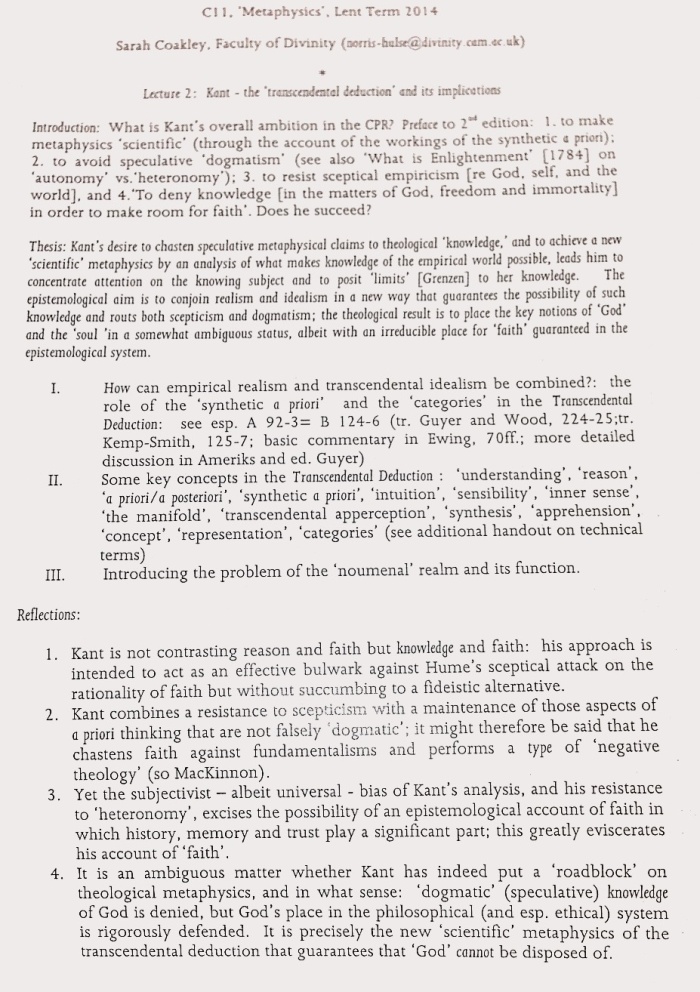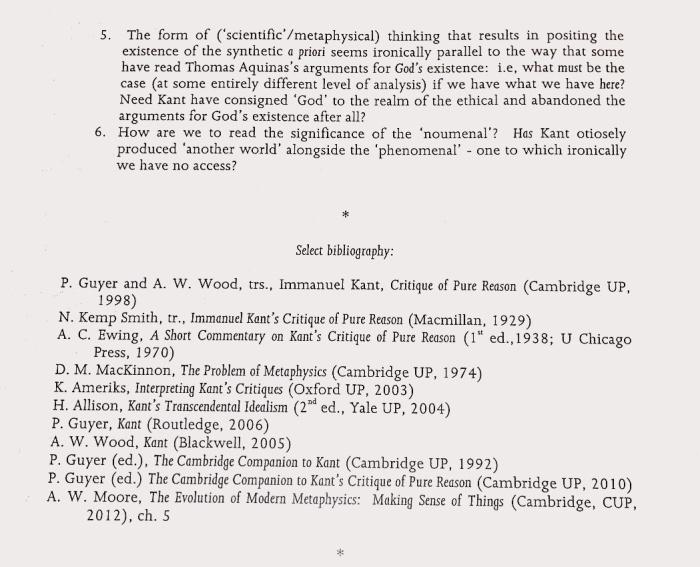The copernican revolution: Acheiving a form of certainty which has all the desirable qualities of being a priori, but at the same time the qualities of being true of an outside world that is coming in.
Introduction: What is Kant’s overall ambition in the CPR? Preface to 2nd edition:
- To make metaphysics ‘scientific’ (through the account of the workings of the synthetic a priori)
- To avoid speculative ‘dogmatism’
- To resist sceptical empiricism (re God, self and the world)
- To deny knowledge [in the matters of God, freedom and immortality] in order to make room for faith.
- We must rethink God, freedom etc in terms of the postulates of practical reason. When we understand how we have knowledge of empirical reality, we will se that we cannot know God, freedom and the soul, but we need them. They have the role of being regulative ideas.
- Faith is not subjective of feeling-oriented. It is truly a rational undertaking.
Does he succeed?
Metaphysics redefined: Uncovers the condition for true knowledge of empirical reality
Thesis: Kant’s desire to chasten speculative metaphysical claims to theological ‘knowledge’, and to achieve a new ‘scientific’ metaphysics by an analysis of what makes knowledge of the empirical world possible, leads him to concentrate attention on the knowing subject and to posit ‘limit’s [Grenzen] to her knowledge. The epistemological aim is to conjoin realism and idealism in a new way that guarantees the possibility of such knowledge and routs both skepticism and dogmatism; the theological result is to place the key notions of ‘God’ and the ‘soul’ in a somewhat ambiguous status, albeit with an irreducible place for ‘faith’ guaranteed in the epistemological system.
Possible positive theological consequence:
- Skepticism is left out, room for God etc found
- Leaves out dogmatism (including church authority)
- This is of major importance for Kant.
Or fatal?
- He has made the individual subject the decider of the position of God. And the position of God has been made secondary to epistemological concerns. Secularization of reason.
- Ecclesiastical and revelatory authority has been marginalized!
I. How can empirical realism and transcendental idealism be combined?
- The role of the ‘synthetic a priori’ and the ‘categories’ in the Transcendental Deduction
The formal conditions of any cognizance
Kant’s argument in the transcendental aesthetic is that one cannot have insight into empirical reality without us thinking it in spatio-temporal terms. He is rejecting two previous alternatives of space and time
- Newton: Space is out there
- Leibniz: Space and time are conceptual constructs
Because space and time is the condition for any intuition, our intuition of them has to be a priori. «space and time are thus pure intuitions that contain a priori the conditions of the possibility of objects as appearances»
Note: Space and time does not really guarantee knowledge.
The transcendental deduction of categories
The conditions under which we really know. How «subjective conditions of thinking should have objective validity»
Does the object make the representation possible, or the representation the object possible?
- If it is the former, then knowledge can never be a priori
-
- Problem: Then knowledge is not universal and certain
- If it is the latter
-
- The, since the representation does not produce its object as far as its existence is concerned, the representation is still determinant of the object a priori if it is possible through it alone to cognize something as an object.
He takes the categories from Aristotle, but adjusts it slightly:
- Of Quantity
- Of Quality
- Of Relation
- Of Modality
Note how ahistorical this epistemology it is: The moment one comes into this world one has all these categories.
Faculties of the mind/soul
- Sense: Receive the stuff
- Imagination: The mediating role: It is the bridge between sense and the application of the categories.
- Apperception: How the mind is able to unify everything that is coming in. Here there is a ‘meness’, which is saying that I am having these experiences, not you. Almost a mysterious unifying capacity of the soul
Problems
(a) Pragramtist’s critique: It is a very weird stuff in between the inside and the outside, this gateway between the incoming material and my knowledge of it. Maybe this was an errant moment in philosophy, which we can do with out. (G.E. Moore: I just know this is a hand)
(b) In order for us to know about the world, how can he know about this stuff that enables this knowledge, these posits? How does he know that? Is that legitimate?
(c) In order to do this, he has opened this humility, this distinction between the phenomena and the noumena. Is Kant positing a whole another world out there that we cannot know?

